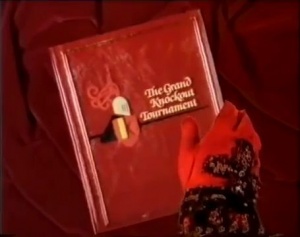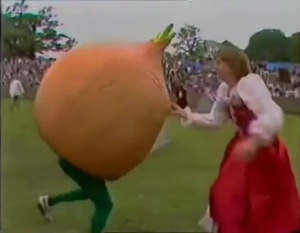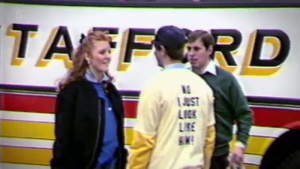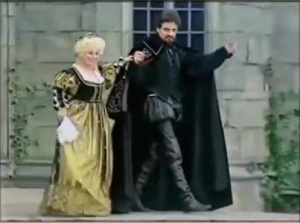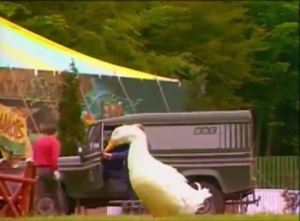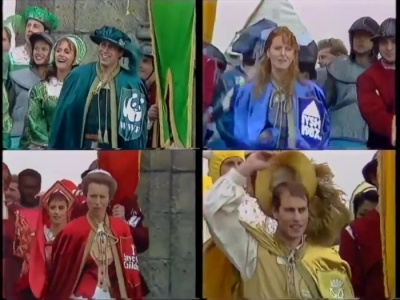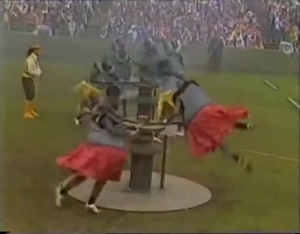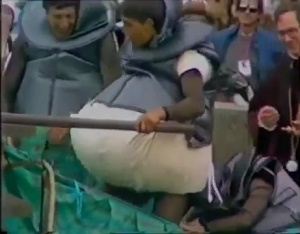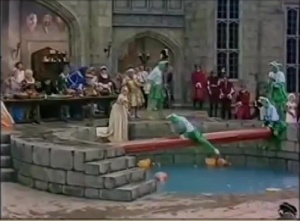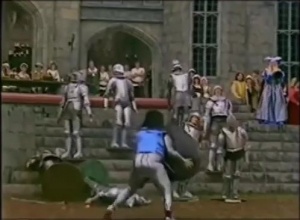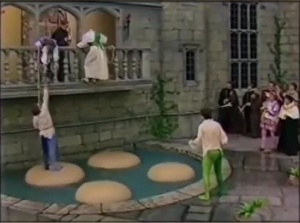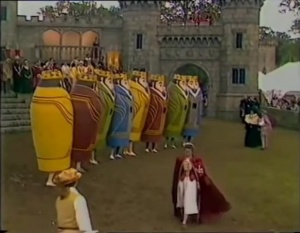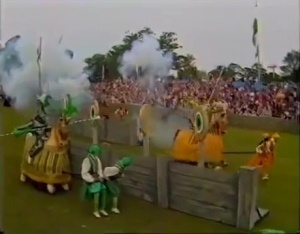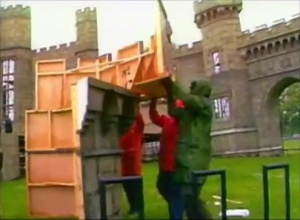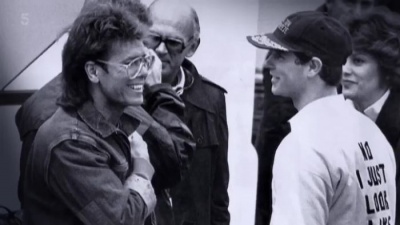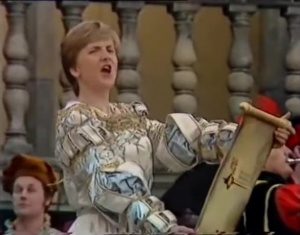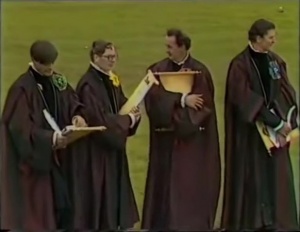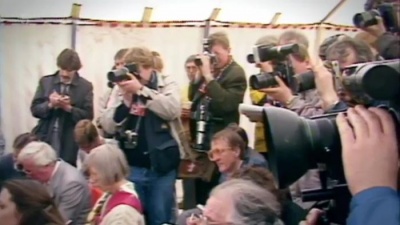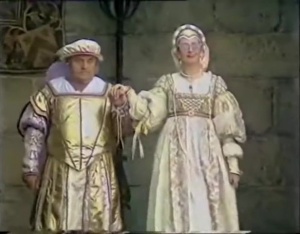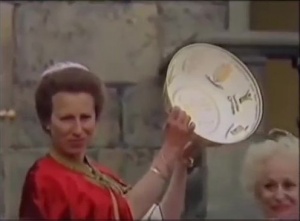Weaver's Week 2023-11-26
Last week | Weaver's Week Index | Next week
"The weirdest show that's ever been on tv" – Aled Jones.
Contents |
The Grand Knockout Tournament
Knockout Limited for BBC1, 17 June 1987
A few weeks ago, Channel 5 showed one of their clip shows about The Grand Knockout Tournament. The basic thrust of the programme was that it was all a complete embarrassment and fit only to be laughed at. This has been the public image of the programme since – well, since about 20 June 1987.
Except that Channel 5's show didn't sustain its own premise. The producer told us that everybody involved took the games seriously, gave their best effort and wanted to win. The producer told us that the celebrity booker got most of the talent himself, talking to stars of stage and screen, and his own family.
So, what is the Week's opinion? We've had another look at the Channel 5 clip show. And we've gone right back to the source material, the original programme as broadcast in June 1987.
What was this Grand Knockout Tournament anyway?
It's a Knockout had run on BBC1 from 1966 until 1982. It was always a very silly show, a group of young fit people did battle for local supremacy by taking part in foolish games while dressed in outlandish costumes. Put on an oversized leek costume and chase around the field until you're caught. Haul a wooden horse while dressed in a cumbersome mermaid costume. Put on an oversized penguin costume and waddle through a tiny gap in the fence.
You get the drift. Winners of each local heat got a trophy for the town hall to display, and went through to Jeux Sans Frontieres, an EBU-sponsored contest to find the best team on the entire continent. The whole concept traces back via French adaptation Intervilles to the Italian programme Campanile sera.
It's a Knockout didn't attempt to educate or inform, it was lighhearted entertainment. Family-friendly fun, nobody gets hurt beyond a bruise or a scrape, and people look silly because they're running around dressed as a giant leek. Children can understand what's going on, there's enough of a contest to keep mums happy, and we're sure that dads will find something entertaining.
But fashions change, and Jeux Sans Frontieres came to an end in 1982. The BBC decided not to continue with It's a Knockout, they'd rather make something more modern and forward-facing, like a chatshow with Terry Wogan. But Knockout continued as an idea – at village fetes, school sports days where they wanted to do something beyond running, and Knockout lived rent-free in the head of many people. When you've grown up with a simple idea like It's a Knockout, it's going to be embedded in your head for life. Maybe that's why people born in the 60s and 70s are so bonkers.
Though Knockout had been put out to pasture, another theme ran through the 1980s. Famous people who do a lot of work for charity, and are quite happy to talk about it. The idea began with The Secret Policeman's Ball for the Amnesty International group, and really gained traction when Bob Geldof invented Band Aid, an all-star single that raised millions for the famine in Ethiopia. Band Aid begat Live Aid, a worldwide concert where rock musicians performed so viewers could be encouraged to give generously. By early 1987, we'd also had Comic Relief, a night of silliness in a London theatre; Sport Aid, a 10km jog across the world; and Sprout Aid, for distressed brassica farmers.
Into this charitable mix came Edward Windsor. A recent drop-out from the army, young Windsor was casting about for his role in life, and appeared to have set his heart on something in the theatre and media. Edward Windsor had a big platform, his Windsor family was known as "the royal family" of England, which opened all sorts of doors to him. Being the sort of person to make a big statement, Windsor reckoned he could single-handedly revive It's a Knockout, invite celebrities to take part and make an ass of themselves, and raise a lot of money for charity. And if it did his career some good, all the better.
A lovely pair of Knocks
Lord Knock of Alton cordially invites you to a day of merriment, fun, silliness, rank stupidity, and raising money for charity.
And so, on Monday 13 June 1987, Alton Towers played host to many of the stars of the moment. Top sportspeople – Gary Lineker, Steve Cram, Barry McGuigan, Judy Simpson. Top singers – Chris de Burgh, Meat Loaf, Kiri te Kanawa, Eddy Grant. Action people – Brian Cooper, Christopher Reeves who played Superman, Anneka Rice, George Lazenby from James Bond. And there was Emlyn Hughes. And Cliff Richard. The list goes on and on.
The BBC had built a fake castle set, complete with duck pond, steps, and a large lawn. There was a banqueting table, and plenty of cannon to fire.
Lord and Lady Knock were our nominal hosts, characters played by Rowan Atkinson and Barbara Windsor. They were assisted by head judge Paul Daniels and scorekeeper Geoff Capes. Les Dawson and Su Pollard presented part of the show, and Aled Jones announced each event. The event commentator and billed host was was Stuart Hall; many years later, we were all horrified to find that Hall is a serial sex pest, and not the sort of person we want to picture.
But the attraction wasn't the prospect of Gary Lineker losing his costume on network television. No, the stars of the show were Edward Windsor, his sister Anne, brother Andrew, and sister-in-law Sarah. The Windsor clan sponsored many charities, and each picked one for the programme. The World Wildlife Fund, Duke of Edinburgh's Award, Save the Children, and International Year of Shelter for the Homeless.
After a prolonged introduction, we finally got into the first game. Winch a cannon over its line and fire it. To do this, one sprightly young whippersnapper (or Cliff Richard) hurtles down the field and attaches two ropes to the cannon. Three men in oversized guards' costumes take up position by the winch, and turn it. But on each revolution, the guard has to jump over the knee-high rope, with the distinct prospect of falling over.
And the prospect of Tom Jones falling over was the heart of Knockout. It's the most simple pratfall, someone undertaking a serious activity (like winching a cannon) is tripped by a rope, and tumbles head over padded polyester costume. And, without fail, it would cause the commentator to laugh like a drain, and that laughter was infectious. Even better in the European editions, where commentary was dubbed on after the fact.
Eventually, one of the cannon comes across the line, and gets fired. All of the others follow. They keep score, 4 points for winning a round, then 3, 2, and 1. But each team gets to play two "jokers", doubling their score on two rounds. There are no bonuses for getting your costume caught in the winching mechanism, as happened to young Gary Lineker. Ripped your skirt off? Never mind, good training for when Leicester win the football league.
Next came the Marathon. Sorry, sorry, the *Asda* Marathon. Even back in these mediaeval times, the BBC did not accept advertising. They would, then as now, acknowledge significant donations to charity. The Beeb would also report on sponsored events, most commonly in sport. In our sphere, Superstars and World's Strongest Man were always for a sponsor's cup. For The Grand Knockout Tournament, most events were named after a principal sponsor.
The Marathon involved players from one team crawling along a pole, suspended over a pool of water. The pole twists and revolves, and if the player falls into the drink, they're out and the next player has a go. Members of opposing teams can attempt to dislodge the crawlers by throwing plastic hams and turkey legs. Health and safety was still quite rudimentary in 1987, but even they knew not to use real BBC food for fear of concussion. Whoever got the most people across the pool without falling in during the allowed time won the game.
Knock, knock, knocking on Kevin's door
Let's quickly describe the rest of the games.
The Ghost of Alton Towers was based on an idea from Jeux Sans Frontieres a decade earlier. One of the gentlemen from the team dresses as a large ghost, carrying his head under his arm. He chases one of the ladies from another team, but her legs are tied together for reasons we really don't want to think about at 8 o'clock on a Friday evening. The lady hops along the lawn, picking flowers until she's caught by the ghost. Or, in this case, until she reaches the end of the flowers, in which case it's the fastest time that wins.
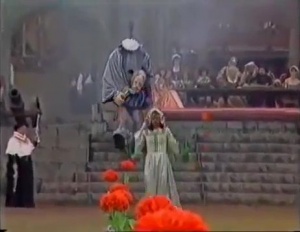 Good training for Nightshade off of Gladiators.
Good training for Nightshade off of Gladiators.
Knock A Knight was sponsored by McDonald's Restaurants, an arriviste chain specialising in "ham"burgers and thin chips. Here, a soldier is blindfolded and cannot see. He has a wrecking ball suspended from the arm of a crane, and eight knights in shining armour to knock over. Although the knight cannot see, he is guided by one of the maids from the team, who shouts instructions from the safety of some distance.
During commentary, it's mentioned that the competitors had some rehearsal time so they could try to work out the game and make for good television. And it meant that everyone took each contest seriously, they might only be playing for bragging rights but – jings! – they absolutely want bragging rights!
The Lovers asked one of the gentlemen from each team to hop across lily pads and climb a vine to deliver roses to their lover on the balcony. When he's delivered all three roses, the lady is to descend the vine and hop or swim across to the land. This game was sponsored by Canada Life and compromised by the set – rather than climb the vines, the lovers could simply pass the flowers up from hand to hand. And it was compromised by Anneka Rice's training, Treasure Hunt had taught her that, when faced with a descent into water, vines are for wusses, she's going to jump.
King of the Castle caused all sorts of brew-ha-ha. It's a Knockout favourite, eight people dressed in a silly costume (in this case, giant pepper pots dressed as kings) try to squeeze through a tiny gap in the wall. Last two on each run are out. And, goodness, there's all sorts of shenanigans as Andrew Windsor claims that his team weren't ready and were impeded by Stuart Hall. Andrew's wife Sarah Windsor joins in, and Andrew asserts "I think the crowd support our protest". He leads the crowd in a chant of "re-run! re-run!" and the whole thing gets more than a little edgy, until the producers declare there will be no re-run. And if you thought that was needless and pointless drama stretched out beyond all interest, we'll have to tell you about the sponsor Harrods' and their owner Mohamed Fayed, and his bitterly defeated rival Tiny Rowland.
The Cooks, sponsored by Britannia Building Society, was a more simple race. An oversized potato, onion, and leek run around the field, to be tagged by their opponents. Once tagged, the vegetable costume comes off and goes into the pot. Fastest time wins.
The Uninvited Guest was another quick event, starring a man in a costume looking suspiciously like a Headless Ghost from earlier. He walks along some planks that are moving from side to side, down the stairs, and sits down on a bench.
And finally, The Joust, where people pull a wooden horse along a path. While travelling, the jockey is to use their lance to hit targets, and the fastest back wins. There's no custard pie, no mess, no gunge – even though these were Knockout staples, Edward Windsor had deliberately planned for "heroism and gentility".
Don't knock it till you've tried it
The costumes on this show were outstanding. All of the celebs had a made-to-measure costume, which looked the part. The headless ghost looked exactly as we'd expect a headless ghost to look like, padded and oversized. The maidens were dressed in demure long dresses which hamper their movement. The wooden horse was a proper wooden horse. The wet ponds were properly wet.
The skies were also wet – there had been a lot of rain in the weeks before, and although the rain held off, everything took place under a damp dark sky. Would The Grand Knockout Tournament have been more fondly remembered if it had taken place on a bright sunny day?
There was huge publicity ahead of the recording. A press release in March had given the impression that the team captains – Edward and his siblings – would be playing in the event. Not so – they're strictly non-playing captains, there to cheer and give advice and gee up their team. On the day, Mike Smith took his Radio 1 breakfast show to Alton Towers, and Steve Wright broadcast live through much of the event. A fifteen-minute programme on BBC1 the Wednesday before built up the excitement even further.
The Grand Knockout Tournament was a landmark event. 18.35 million people watched the broadcast on Friday night. It was number three in the ratings for the week, slightly behind the consolidated audience of Eastenders (and that got a repeat). The event £1.5 million for charity (accounting for economic inflation, that's around £7 million today).
But the press were unimpressed. Many of the "news"paper scribblers had been left in the press tent, and didn't see anything of the action. If they were lucky, they'd been able to watch the action on screens. Couldn't ask questions, or get a flavour of the show. Or have a bite to eat.
After the event, producer Edward Windsor made the error of talking to the press. Tired after all his hard work, he snapped at the reporters. "Thanks for sounding so bloody enthusiastic! What have you been doing all day?" Journalists are a tribal bunch, they'll defend themselves from any attack, whether fair or otherwise. The bad headlines wrote themselves, followed by the lines of invective and snark that passed for television criticism in 1987.
Edward's mother was also unimpressed. Elizabeth Windsor, the family matriarch, had long had misgivings about the whole project. Apparently, it made her family look "foolish" and was "unbecoming".
Why was the old Queen so annoyed? Apparently, by donning Olde Worlde fancy dress, by romping through a series of stupid games with celebs dressed as squires and damsels and minstrels and knights. By performing for the delight of 18 million people on television – and a crowd of 2000 at the park – the young royals had mocked the real costumes and ceremonies of their own House of Windsor. It threatened to break royalty's magic spell.
And that could never do. Elizabeth Windsor, perhaps deferring to her own social-climbing mother, believed that her family was superior to others, and wanted them to act like they're superior to others. Don't break the spell, don't enquire as to how the magic happens, do not peek behind the curtain in the Emerald City.
Edward had made some concessions to his mother's views, he and his siblings were non-playing captains, leaving the dressing up to celebrities and guests. Perhaps this was wise. Perhaps it left the young Windsors stranded in the uncanny valley, neither a decorative figurehead who did nothing, nor a useful worker in a cause they believed in.
When Elizabeth Windsor deemed something to be bad, a chorus of sycophants and cheerleaders treated that opinion as the definitive truth. Philip Ziegler, who makes a living out of writing about the Windsors, called it: "such an ill-judged enterprise... full horror of this extravaganza." Jonathan Dimbleby, in a 1994 book about Edward's older brother Charles, called it "the Windsors' nadir", which was a remarkable claim even at that time.
James Whitaker was published in the Daily Mirror, which enjoyed a large circulation. A decade later, he cited The Grand Knockout Tournament as a "total watershed" in the public's perception of the Windsors. "If you really had to pin down where it all went wrong, I would always point to It's a Royal Knockout [sic]. That was the start of the high-profile thing that started everyone thinking, `Who are these appalling people?'"
This narrative has come to dominate the memory of The Grand Knockout Tournament. Not whether it was good television, not whether it entertained and raised money for charity. All of the work has been eclipsed by the opinions of older generations who were more concerned with appearances, and the journalists who felt insulted.
Watch more
The show in full, with original commentary.
It's a Royal Knockout: The Untold Story on Channel 5 (free registration required, probably .gb only)
Stuart Millard's video essay A Right Royal Disaster covers broadly the same ground as Channel 5's show, though without access to the producer and Nina Myskow.
Towers Street, an Alton Towers fansite, has scans of the event's programme
Knock three times on the ceiling
We cannot agree with the late Elizabeth Windsor. A lot of people put in huge amounts of effort for the benefit of charity. Sure, some people might have advanced their careers a little – young Edward perhaps not as much as he'd have liked, he'd finish the year with Andrew Lloyd Webber's Really Useful Group – but the charities were the big winners.
The contest was outdated, almost a greatest hits package of great Knockout games. But it was familiar and still remarkably representative of light entertainment of the time. Indeed, 1987 saw something of a renaissance in old-style variety shows, with Seaside Special and Beat the Clock revived on BBC1, with Opportunity Knocks coming back after decades off air. The Grand Knockout Tournament rode the retro fashion of the time; it's no more anachronistic than the Big Brother we discussed last week.
The show was surreal, of course. Bizarre. Bonkers. It wasn't clever television, and it was never going to be clever television. It wasn't bad television, but it made a lot of enemies. The journalists were excluded and chose to take umbridge. Television reviewers of the time chose to get in lots of puns rather than discuss the programme's merits. The royalists deferred to the received opinions of the Windsor matriarchs. And when all three are lined up against a show, it's doomed, regardless of merits.
In other news
We're sorry to hear that Annabel Giles has died. Ubiquitous on telly in the 1980s and 1990s, she often made the panel sparkle on daytime filler like Through the Keyhole, and was astute enough to spot the wind-up behind a Gotcha Oscar. Her biggest game show credit was Hit the Road, a frothy 1994 entertainment in the spirit of It's a Knockout. Married to rock royalty Midge Ure for the 1980s, Annabel subsequently re-invented herself as a successful author. Brain cancer claimed Annabel's life at the age of 64.
Quizzy Mondays
Absolute scenes on Quizzy Monday this week, as a team on University Challenge dared to wear black shoes. This annoyed John NotABotHonest08981717, who expected everyone on UC to wear trainers. "I am absolutely aghast! This is clear evidence of shoeism and discrimination against people who wear trainers and pumps! For reasons that exist only in my head, this reflects religious and cultural bias and the BBC should be taken off until I come to my senses which will take a very long time indeed!!!" wrote Mr. NotABotHonest08981717, only far less coherently and with many more spelling mistakes. With literally squillions of the NotABotHonest family monopolising antisocial media, the BBC issued a strongly worded statement. In it, they invited Mr. NotABotHonest08981717 to go away and shut up, and in language Mr. NotABotHonest08981717 will understand.
None of this nonsense on BBC Brain, which reached semi-final three. A question about the origins of Thanksgiving provided a neat little transmission indicator; a question about "Cyber Monday" showed that it was only coined in 2005 and still isn't old enough to buy the alcohol it sells. Eleanor Ayres and Sue Brierley matched each other shot for shot in the opening rounds, only for Eleanor to draw ahead in the third cycle. Sue pulled back level when Eleanor dropped her opening question, and there we were with just one round to go. Eleanor got one, but missed the originator of "Short sharp shock" – Sue picked it up, only to miss her own starter. John Esling wasn't out of contention, needing three to join the tie, but didn't recognise the anthem of Greece.
So, once again, we have a tie. Just a two-way tie this week, which was won by Eleanor Ayres. She'd also won the old-style tie breaker, 5 bonuses to 3.
A tie break was also required on Mastermind, as Oli Hanson (films of Martin McDonagh) beat Scott Dalgliesh (US presidential elections 1948-2000) 4-3 on questions from the black chair. Both had reached 21 points and no passes, one ahead of Tom de Salis (music of Tom Waits).
We very nearly needed a tie break on Only Connect, as Video Nasties beat Solomons by 25-24. Great spots of the night included "a pew, Mr Strong, is a standard" – that's bench, Mark, benchmark. Victoria noted her boredom about a question about snooker colours and roadsigns, there's too much snooker for the host's liking. Mentions also for Lotso, Kirsten Stewart, and two nods to Ma Rainey. But it was neck-and-neck throughout, rarely more than a point between the sides, and it could have gone any way.
And they were preparing a tie breaker on University Challenge, where Christ Church Oxford beat Emmanuel Cambridge by 155-130. Compared with many of the matches this year, it was a low-scoring evening, with lots of bonuses dropped and a few starters left for dead. Highlights included Christ Church on flags with horses, and Emmanuel motoring through film adaptations of Greek myths. Christ Church took a lot of time to get their last couple of sets of bonuses, perhaps to help run down the clock.
Lots of shows reach their final this week. Bake Off finds its champion (C4, Tue). RuPaul's Drag Race names the fairest of them all (BBC3, Thu). Junior Eurovision Song Contest celebrates the young heroes of our time (CBBC, TG4, BBC2, Sun); we'll have a review next week. Handmade completes its construction (C4, Sun).
We also have new episodes of Dickinson's Real Deal (ITV, weekdays). Over on Antiques Road Trip, they've got Dick and Dom (BBC2, Wed). Next Saturday is musical theatre week on Strictly (BBC1).
Pictures: Knockout Limited
To have Weaver's Week emailed to you on publication day, receive our exclusive TV roundup of the game shows in the week ahead, and chat to other ukgameshows.com readers, sign up to our Google Group.

